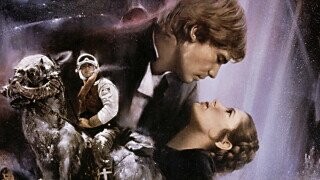How 'Star Wars' Hacked Our Brains Into Loving It

It's "Star Wars Day," the faux holiday in which we all celebrate our favorite space adventure movie/bow down to our benevolent corporate overlords. We're also using this as an opportunity to reflect on why this series about laser swords and drunken alien bar patrons became so popular in the first place. Why does it speak to us in ways no major religion can even come close to? Why do we forget important details of our own lives but somehow remember who goddamn Ben Quadinaros is? Here's a thought: maybe these movies are communicating with us on a primal level ...
It's been argued that our modern anxieties have been at least partly shaped by our evolutionary history -- specifically our ancestors' fears of being hunted. Author David Quammen once claimed that "among the earliest forms of human self-awareness was the awareness of being meat." Even though most of us don't have to worry about being mauled by saber-toothed cats or bitten by venomous snakes, some experts have said that "these animals live on as ghosts in the human central nervous system."
Don't Miss
So many of the most successful movies of all time have tapped into that unconscious fear of evading predators; Jaws, Jurassic Park, most slasher movies -- not to mention the movie literally called Predator. Even Raiders of the Lost Ark exploits our inherent bias towards snakes that "evolved in our common ancestors." Star Wars similarly takes advantage of that same deep-seated human fear of becoming lunch. Most obviously, the original trilogy features a handful of actual predator-like creatures; that one-eyed garbage snake in A New Hope, the giant toothy space slug in The Empire Strikes Back --
And Return of the Jedi finds Luke almost being eaten by fanged monsters twice in the span of like 12 hours.
Even in the prequels, this idea was repeatedly underscored. Attack of the Clones ends with Anakin and Obi-Wan nearly being chomped to death in a Geonosian death arena, and early in The Phantom Menace, we are specifically reminded that humans are way down in the galactic food chain because there's "always a bigger fish."
Weirdly, the movies also reinforce this theme in ways most of us don't consciously register. Take the very first shot of the first movie: the Tantive IV speeding away from the attacking Star Destroyer. As viewers, we immediately align with the plight of our heroes because we instinctively side with the prey fleeing the hunter.
Throughout the series, the Empire's tech basically functions as apex predators, whether it's the Death Star devouring the Millennium Falcon, or AT-ATs, which aren't just weapons of destruction, they're (somewhat impractically) designed to be huge, animalistic beasts.
Between this and all of that not-so-subtle Freudian sex stuff, man, the Star Wars franchise really did a psychological number on all of us.
You (yes, you) should follow JM on Twitter! And check out the podcast Rewatchability.
Top Image: Lucasfilm